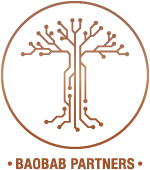When Baobab Partners CEO Stratten Waldt left a full-time position to become a freelancer, he had no idea that he would be running a global business just 3 years later. But an innovative approach to business and his can-do attitude resulted in happy clients, and as the business took off, he quickly realised that he needed to hire a team. Stratten partnered with a fellow Duke student, and together they founded Baobab Partners in late 2017.
In 2017, while Stratten remained in the US, his business partner was pursuing further studies in the UK. Having a CEO and CTO on opposite sides of the planet may seem crazy to many, but for this duo it worked extremely well. The time difference made it easy for his partner to fit work around his studies and it was during this time that they found their first hire, a fellow Masters student based in the UK. It quickly became apparent to both that hiring internationally was the logical approach. They could hire the person with the best skills who would be the right fit for the team without geographical limitation and moreover, they could offer services to clients round the clock without resorting to insomnia.
From the beginning, they took every opportunity to develop an intentional work culture based on a strong sense of internal cohesiveness. They emphasized that while Baobab was still young and in the early stages of development, clear communication was a top priority, along with mutual respect and transparency. This ethos has been maintained across all aspects of operation, from sales to expansion and hiring to internal processes.
Three years later, Baobab Partners has offices in both New York City and Lagos, Nigeria. Our employees can be found around the world, from the U.S. to the Dominican Republic, Canada, United Kingdom, Nigeria, Kenya, and more. As a small company, we consistently check in on a more personal level across these international boundaries, and have learned to work effectively with varied time zones and diverse cultural backgrounds. Clear communication is imperative in this line of work, and it is something we actively work to maintain both internally and with our clients.
In light of the unprecedented scale of COVID-19, the intentionality and sense of responsibility with which Baobab is run is more apparent than ever. Our team is flexible and able to adapt to unexpected situations. We are committed to supporting our clients every step of the way. Our experienced team is always ready to maintain our high level of efficiency and professionalism in our work while continuing to provide skilled services with excellent results.





